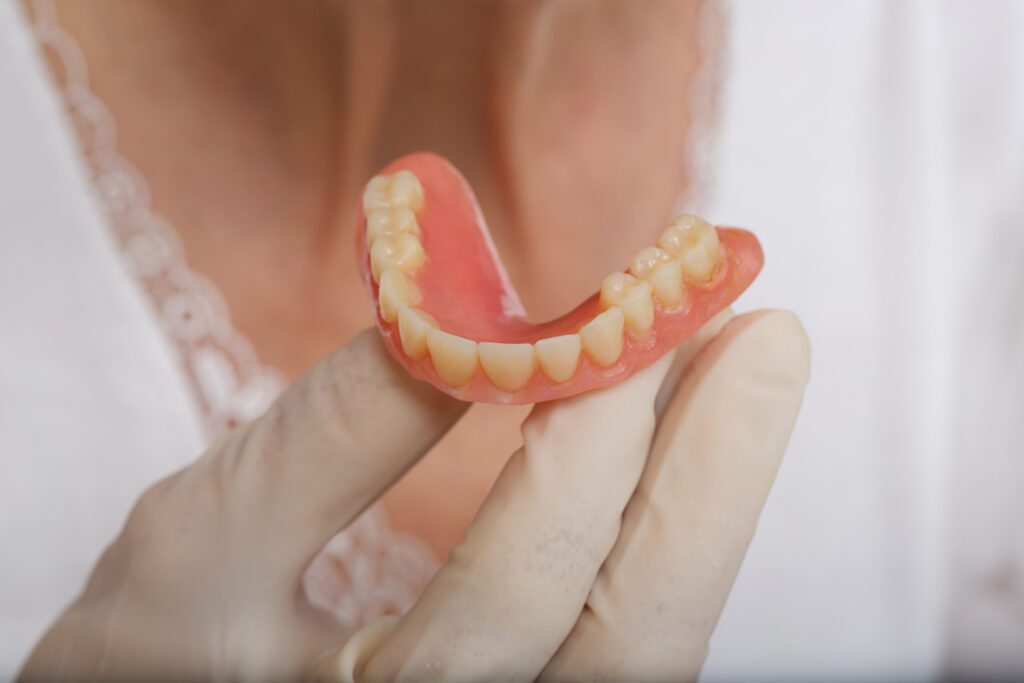After you lose your teeth, you also lose your ability to eat the foods you love. If you have missing tooth gaps in the front of your mouth, you can feel self-conscious around others. Missing teeth cause functional and aesthetic problems. Edentulous patients, or patients without teeth, benefit from lasting dental restorations. Dentures and partials in our Nederland, TX office can restore your missing teeth with natural-looking replacements.

Types of Dentures
Partials are dentures that replace rows of missing teeth. These dentures can restore missing teeth in different parts of the mouth. Complete dentures replace all of the teeth in the mouth. Traditional complete dentures are removable with a gum-colored resin base and false teeth. These dentures can also use support from implants.
Dental implants provide support for removable and fixed dentures. Implant-retained dentures are removable and snap in place, while implant-supported dentures are not removable.
In addition to full and partial dentures, we provide these types of dentures:
- Overdenture: An overdenture fits over implants or remaining natural-prepared teeth. If possible, we recommend an overdenture to help preserve the health of your jaw bone. Overdentures are beneficial for patients who still have remaining teeth or receive implants.
- Immediate Denture: We place this temporary denture while you wait for your permanent denture. We make immediate dentures according to the measurements we take during your first visit.
- Conventional Denture: We place this denture 8 to 12 weeks after we remove your remaining teeth. We may remove infected or severely damaged teeth before we place dentures to prevent further oral health problems. The conventional denture is placed once your gum tissue heals.
Removable vs. Implant Dentures
When considering dentures, you likely think of removable teeth you keep in a glass of water. These traditional dentures use adhesive to stay in place and need to stay moist to avoid drying out.
Dental implants are small titanium posts that replace missing teeth at the roots. Unlike traditional dentures, implant dentures do not lay on the gums. A surgeon places implants in the jaw bone, supporting the health of the jaw and gum tissue.
While implant dentures offer many benefits, they can cost more than removable dentures. We will consider your dental health, budget, and goals before treatment to ensure dentures are right for you.
Getting Dentures in Nederland, TX
Before denture treatment, we will ensure you do not have any outstanding dental problems. We can provide gum disease treatment, tooth extractions, root canals, and other treatments. Our team will work with you to determine which denture type fits your needs and goals.
Then, you will visit our office to begin treatment. If you receive a removable denture, we will take impressions of your teeth. We will provide a temporary denture while we send these impressions to a lab.
Technicians will follow our specifications to create your custom dentures. Once your final dentures are complete, we will remove your temporary denture. Then, we will ensure your final restoration looks and fits naturally and cement the denture.
Implant Dentures
We must ensure you are an implant candidate if you get implant-supported dentures. You must be healthy and have enough jaw bone to support the implants. Jaw bone loss is common after losing permanent teeth. We recommend bone grafting to build up healthy bone tissue.
First, we will take X-rays to plan your implant placement. A surgeon places the implant posts in the jaw bone beneath the gums. The jaw bone takes three to six months to grow around the implants, a process called osseointegration.
Then, we will place abutments, or connector pieces, linking the implants and the dentures. We will take impressions to send to a lab to create your custom denture. Once you are fully healed, we will remove the temporary denture and place the final denture.
Dentures and Partials FAQs
We welcome you to learn more about dentures in our Nederland, TX office with answers to these common questions:
How long does it take to get used to dentures?
It will take time to get used to your new teeth. Getting accustomed to dentures can take several weeks to a month. As you get used to your restoration, you will find it easier to bite, chew, and speak. You will also find your dentures feeling like normal teeth over time.
How do you clean dentures?
After you receive your dentures, ensure you continue cleaning your restoration and any remaining natural teeth. We can provide tips on brushing and flossing your fixed denture. When brushing, use a soft-bristled toothbrush. Interdental floss or a water flosser can help remove food between your false teeth.
If you have a removable denture, you must remove it before sleeping. Then, soak it in a denture cleaner. You can also brush and floss your removable denture with a soft-bristled toothbrush and toothpaste.
Why should I get implant-supported dentures?
Dental implants offer durable support to dentures. Compared to traditional dentures, implant-supported dentures:
- Last longer (implant posts are permanent)
- Do not need rebasing or relining
- Improve speech
- Support the jaw bone
- Prevent facial sagging
While implants may take longer, they last and help support your tooth, gums, and jaw.
Why should you soak removable dentures?
Keeping removable dentures moist ensures they do not dry out or crack. Placing your restoration in a denture cleaner also helps remove bacteria and leftover food from your restoration.
However, you cannot wear removable dentures during sleep because they can lead to dry mouth. During sleep, dentures can reduce the amount of saliva you produce, increasing your risk of gum inflammation and infection. Denture stomatitis, or thrush, leads to difficulty swallowing, mouth sores, and a sore throat or mouth.
What is All-on-Four?
All-on-four is a treatment method that uses as few as four dental implants to replace a missing tooth arch. On average, four to eight implants can secure an upper or lower denture. Treatment planning ensures the surgeon can maximize jaw bone to place the implants.
What is “Teeth in a Day”?
“Teeth in a Day” refers to removing problem teeth, placing implants, and then placing a temporary denture in one visit. This method ensures you will not be without teeth while waiting for your permanent denture.
Restore Multiple Teeth
Replace missing teeth with dentures in our Nederland, TX office. Call Coastal Dental Care at 409-215-2035. You may also schedule an appointment with us online.
Let us know if you have questions about dentures. We will be glad to answer your questions at your next visit.
